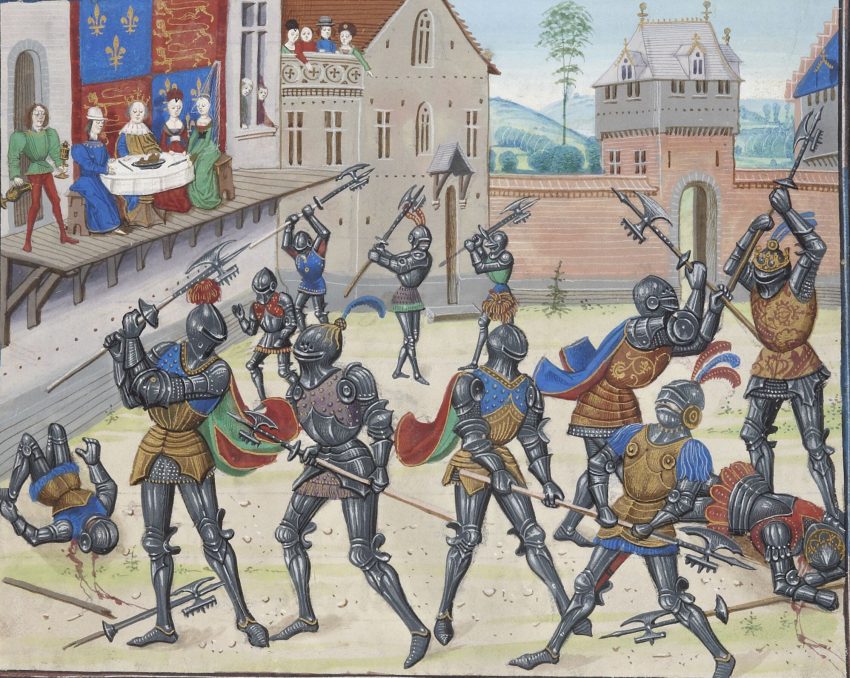I hear a lot of people asking how to become a knight. I want to tell them something like “Do this and follow this path and here’s a checklist” but that would be lying.
First off, what kind of knighthood are you talking about? A member of the Order of Santiago in the late 12th century was quite different from a member of the Order of the Golden Fleece in the late 15th century and these are almost completely different from the Order of the British Empire today.
Chivalry, too changed over the centuries.
Many who ask this sort of question seem to be obsessed with their ideas of the Knight Templars and with righteous Crusaders fighting for the Holy Land. Others love the idea of the 19th century fictional chivalry and all the romance to have come from that.
There is little to offer those sorts of people as they are often set in their ideas of knighthood and seek a simple path that probably never existed historically.
Some just love the idea and seek the title. There are plenty of places where you can join self-styled knightly orders, some with little more than a web form and a few dollars. Go for it.
If you seek a recognized, legitimate knighthood, the International Commission for Orders of Chivalry has very strict requirements for a knightly order to be considered legitimate. They have a list of orders that meet their super strict requirements.
Another option, if you are a subject of the British Monarch, is something like the Order of the British Empire, which awards knighthood to subjects who have done great deeds. This is a real order and the knighthood is bestowed by the British monarch. For British subjects, there are a few other orders as well.
Then there is the Society of Creative Anachronism is an educational non-profit that acts much like a Live Action Role Playing Game (LARP) with members around the world that has an Order of Chivalry. Knighthood there is earned through a complex system of meritocracy and peer recommendations. While not widely recognized outside the SCA, this order tries to recreat something of a historic knighthood.
Or maybe you just want to look like one? Most Renaissance Faires have armored fighters and jousters. You could join up with one of the many troupes who do that.
You just want to fight, you say? There are two good options here: HEMA (Historical European Martial Arts) is an umbrella term for just what it says, but includes what is called, “Harnischfechten” – armored fighting. This attempts to (academically) replicate armored martial arts of medieval and renaissance Europe. Alternatively, the modern sport of “bohurt” (various spellings) recreates the medieval and renaissance armored tournament on foot. It is intense, full speed and full contact, in a modern sporting setting.
As for me, I love to study the various historical aspects and I look at how best to apply them to the modern world. I do fight in the SCA and I do bohurt with Armored Combat Sports, and also study harnischfechten. Alongside, I seek to understand the mindset from the eaerliest Roman cavelry to the modern elite who hold titles that mean little in today’s world. I see some common threads of honor and integrity and I see chivalry as an inspiration to grow to be a better person than I was yesterday. The accolade of making a chivalrous person a knight has, ideally, thoughtout history, been bestowed on those most worthy, those who are recognized as leaders. The idea of applying the concept of kai zen to one’s own life seems to me to be the modern equivalent.
Chivalry isn’t about being the best, but rather becoming better and aspiring to be the best. Knighthood is just official public recognition of your achievement. I use chivalry as a metaphor to improve myself and knighthood as an icon of that lofty goal.
What about you?

Well I have an earned doctorate in educational leadership but have always thought the title of “Sir” was much more impressive by than “Dr”.
Interestingly, I am technically a subject of the monarchy. I was born in Canada. But now live in the USA.
My surname is Fowler reaching back through the history days of the Anglo-Saxon tribes of Britain. 1st record of the surname in Wiltshire where one of the first records of the name was John the Forglere who was listed in the Hundredorum Rolls of 1273. We clearly have a unique Fowler coat of arms – titled – Sapiens qui vigiat … so I going to continue in the lineage of this line!!
I would like to become a Knight and have the title sir in my knighthood hope I can get help with that always wanted to be a knight of this century.
I think a lot of us would like to do that. Knighthood is different in some ways in today’s society. I often think it might be best to live the best, most honorable, chivalrous life we can. If anyone else recognizes us for our positive qualities, wonderful! I feel it best to live our best and continually strive to be better and hope we can inspire others to do the same.
I want to create a knighthood here in the US, totally dedicated to TRUTH and COMPASSION. My knights would also be celibate, and do not drink alcohol.